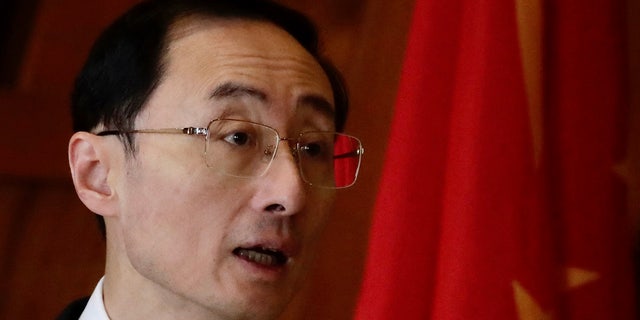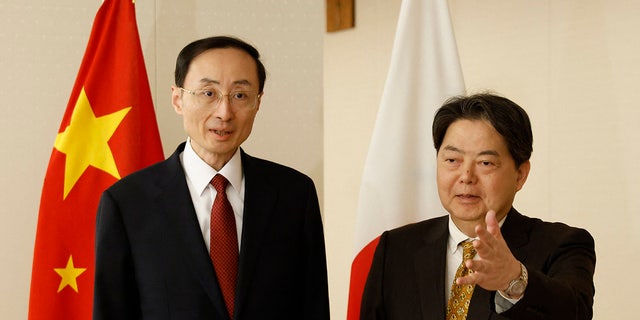China summons Japan ambassador to rebuke G7 summit ‘camp confrontation and Cold War mentality’: report
China’s Vice Foreign Minister Sun Weidong reportedly summoned Hideo Tarumi, Japan’s ambassador to China, on Sunday to relay “solemn” protest from Beijing in response to the “hype around China-related issues” that occurred at the G-7 summit of the leaders of the world’s leading democracies in Hiroshima over the weekend.
In a statement, cited by Japan Times, the Chinese Foreign Ministry said Sun communicated Beijing’s “strong dissatisfaction and resolute opposition” to remarks made during G-7.
The Japanese Embassy said in a statement of its own that Tarumi told Sun that it was “only natural” that such references were made and urged China to change course, according to Japan Times.
“If China does not want these issues to be referenced, it should first respond more positively,” Tarumi said.
The Chinese vice foreign minister reportedly further expressed to the Japanese envoy that matters related to Hong Kong, Xinjiang, and Tibet represent China’s “purely internal affairs” and that “no external forces will be allowed to make irresponsible remarks and arbitrarily interfere.”
G7 SUMMIT PHOTO SHOWS ISOLATION RUSSIAN PRESIDENT VLADIMIR PUTIN IS FACING ON WORLD STAGE
As for Taiwan, Sun said the island sits at “the core of China’s core interests” and “a red line that must not be crossed.”
According to the South China Morning Post, Sun also accused the U.S.-led bloc of “camp confrontation and Cold War mentality,” demanding Japan “correct its understanding” of China.
The White House shared a join communiqué over the weekend in which the G-7 leaders provided a broad-ranging summary of their work during the summit in Hiroshima.
China, the world’s No. 2 economy, sat at the nexus of many of those concerns. There is increasing anxiety in Asia that Beijing, which has been steadily building up its nuclear bomb program, could try to seize Taiwan by force, sparking a wider conflict. China claims the self-governing island as its own and regularly sends ships and warplanes near it.
The G-7 leaders’ statement warned that China’s “accelerating build-up of its nuclear arsenal without transparency (or) meaningful dialogue poses a concern to global and regional stability.”

North Korea, which has been testing missiles at a torrid pace in an attempt to perfect a nuclear program meant to target the mainland United States, must completely abandon its nuclear bomb ambitions, the leaders said, “including any further nuclear tests or launches that use ballistic missile technology. North Korea cannot and will never have the status of a nuclear-weapon State under [international nuclear treaties],” the statement said.
BIDEN TELLS REPORTER AT JAPAN G7 SUMMIT TO ‘SHUSH UP’
“There is no legal basis for China’s expansive maritime claims in the South China Sea, and we oppose China’s militarization activities in the region,” the communiqué said.
“We will keep voicing our concerns about the human rights situation in China, including in Tibet and Xinjiang, where forced labor is of major concern to us. We call on China to honor its commitments under the Sino-British Joint Declaration and the Basic Law, which enshrine rights, freedoms and a high degree of autonomy for Hong Kong,” it added.

The G-7 leaders also used their summit to roll out a new wave of global sanctions on Moscow as well as plans to enhance the effectiveness of existing financial penalties meant to constrain President Vladimir Putin’s war effort.
“We call on China to press Russia to stop its military aggression, and immediately, completely and unconditionally withdraw its troops from Ukraine. We encourage China to support a comprehensive, just and lasting peace based on territorial integrity and the principles and purposes of the UN Charter, including through its direct dialogue with Ukraine,” the communiqué said.
Asked about the summoning of Japan’s ambassador at a general press conference Monday, Chinese Foreign Ministry spokesperson Mao Ning said, “Japan, as this year’s G7 chair, joined others in smearing and attacking China and grossly interfering in China’s internal affairs in a series of events held during the Hiroshima Summit and the Leaders’ Communiqué. The Chinese side deplores and rejects this and has made serious démarches to Japan. The Japanese side needs to correct its perception of China, adhere to the principles in the four political documents between the two countries, and work for the steady development of bilateral ties in a truly constructive way,” according to a readout published on the Chinese Foreign Ministry’s website.
Read the full article Here


